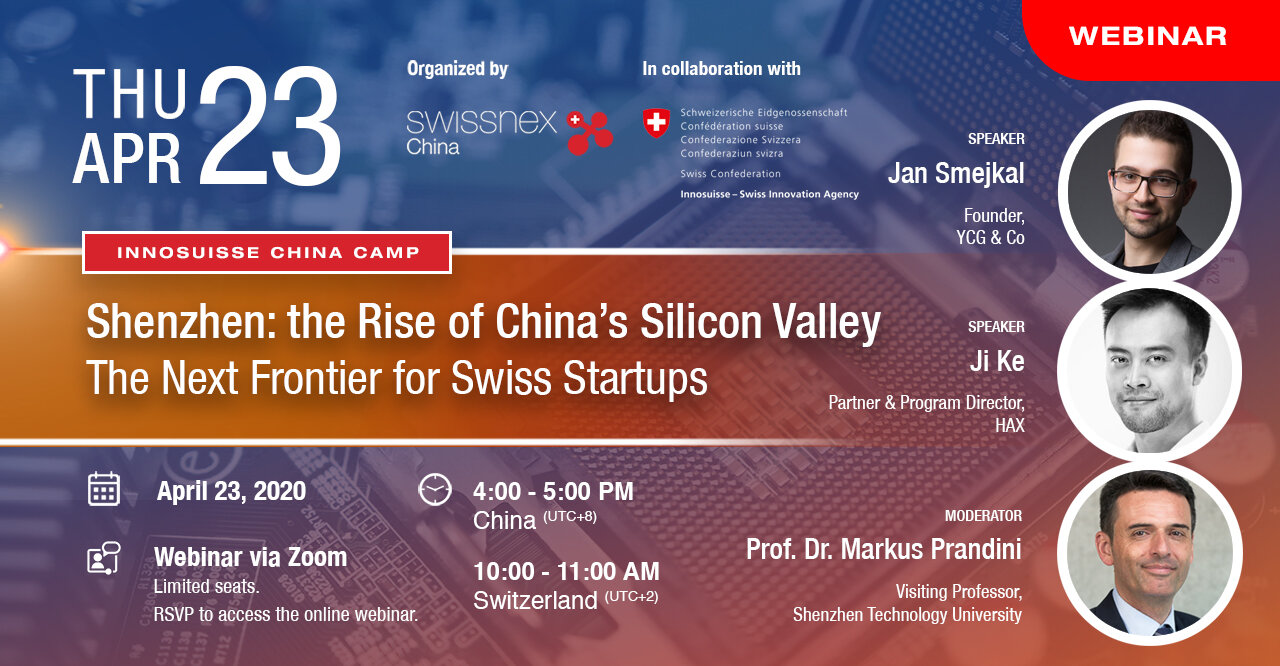By Nan Chen, Junior Project Manager - Innovation & Entrepreneurship
Within 40 years, Shenzhen has grown from a little fishing village to a megacity of around 13 million residents and along the way it has also become the manufacturing hub of the global tech industry. If Silicon Valley is the world’s software capital, then Shenzhen is the home of hardware, with the world’s most well-developed hardware industry supply chains as well as ample intellectual capital. Shenzhen has deep ambitions to become a world leader in technology innovation with investment of 4% of GDP in R&D. Situated in the country’s most open and economically vibrant region, Shenzhen is home to some of the biggest tech companies in the world, as well as an emerging innovation hub for international startups.
Swiss startups, academic and R&D institutions increasingly wish to set foot in Shenzhen. Therefore, on April 23, we presented our second Innosuisse China Camp webinar to our Swiss stakeholders, to have an overview on how to tap into this innovation epicenter and gain access to the latest technologies developed in Shenzhen. We were joined by 104 live participants (incl. 23 Swiss startups).
Before the presentation of the two speakers, our moderator Prof. Markus Prandini, Visiting Professor at Shenzhen Technology University, gave us a brief introduction on Shenzhen and its ecosystem. He presented three questions which were later covered during the webinar:
What are the characteristics of the business and innovation ecosystem of Shenzhen?
How can a Swiss or foreign startup increase its competitive advantage by leveraging the innovation ecosystem of Shenzhen?
What can we expect from Shenzhen or China in the next two to three years?
The first presenter, Jan Smejkal, a.k.a. YourChinaGuy, founder of YCG&Co, is an active startup advisor and public speaker. He managed to scale Startup Grind (the world’s largest startup community) to 100+ cities in Asia (including 25+ cities in China) as the director of the company in the region. He created The Dinner hosting exclusive networking events in China and around the globe. As an expert in helping businesses to accelerate their activities in China, Jan shared his personal experience about how to build business in China as a foreigner and how to explore different opportunities in Shenzhen.
He illustrated Shenzhen as:
A hotspot, not only for innovation or manufacturing, but also for connectivity in the region (Greater Bay Area).
A strategic place to bootstrap your startup.
An innovation hub with strong support of the government to push their innovation.
Our second speaker, Ji Ke, Partner & Program Director at HAX, is responsible for driving the content and delivery of the HAX Seed accelerator program in Shenzhen. He is a mechanical engineer by training and is skilled in designing complex mechanisms for a wide range of industries. Ji is deeply connected to the innovation ecosystem of Shenzhen and this provides the frame for his presentation on the topic of “leverage the hardware ecosystem to boost up your startup speed”. He started by introducing HAX and why - as a foreign company - they choose Shenzhen to set up an office to help foreign startups to flourish.
He mentioned that for a hardware startup, it’s imperative to create as many iterations as possible and as short time as possible. The maturity of a startup is defined by the number of iterations, not by how long a startup has been in existence - and Shenzhen is the best place to do that.
HAX is more of a Venture Capital than an accelerator. They fund and support physical and digital early-stage startups. Those startups are co-located across their three global locations (San Francisco, Shenzhen and Tokyo) and access to premier ecosystems. Shenzhen has been identified as the world’s best physical ecosystem for sourcing, prototyping, engineering, industrial design and manufacturing. Startups work with HAX for 9 months across three phases (pre-product market fit, technology development, ramp & fundraising) aimed at a fundraising round. Every year they have more than 1500 startups applying for their program and they invest in 40 of them every year.
Ji Ke went through several points it takes to run a successful startup:
To be clever
Preservation
Domain Expertise
Network expanding
The last point Ji highlighted was that, Shenzhen is essentially an access to the world’s best technology, investors, partners and experts for HAX.
During the Q&A session, more than 20 engaging questions were posed by the live audience, on topics such as how to approach Chinese VCs and accelerators, IP, fundraising and more.
Finally, we would like to thank Jan Smejkal and Ji Ke for their excellent presentations and Prof. Markus Prandini for his masterful moderation of the event. Last but not least, we would like to express our appreciation to our viewers for having participated in the event and for all the interesting questions during the Q&A session!
We look forward to seeing you at our upcoming events!






